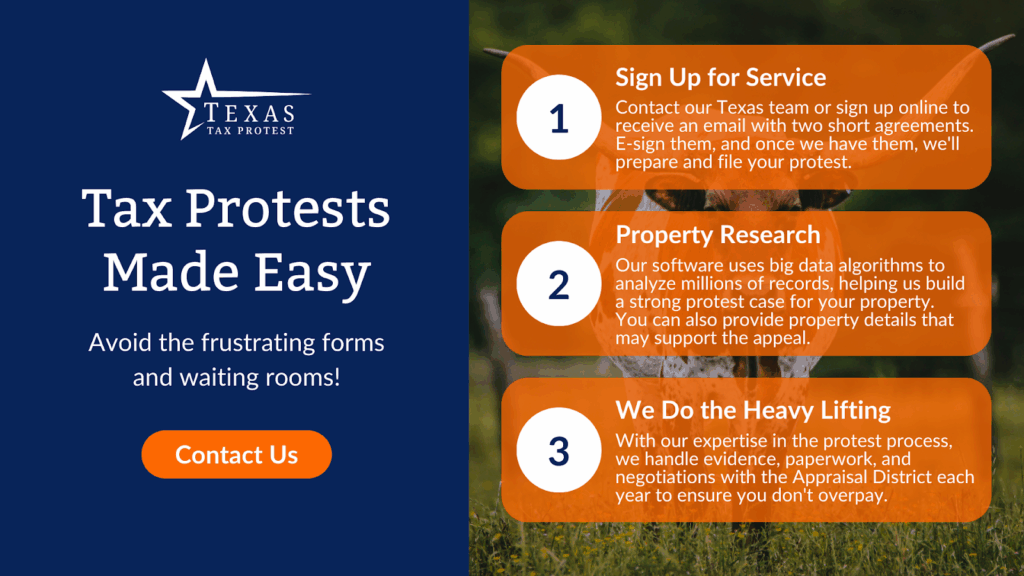Real Estate Taxes Vs Property Taxes: What’s The Difference And Why It Matters
November 5, 2025

Key Takeaways:
- Definition Clarity: Real estate taxes are a type of property tax, but property taxes can include other assets in certain states.
- Calculation Process: Texas uses mass appraisal models to calculate property taxes, based on local tax rates and adjusted comparable properties.
- Valuation Matters: Knowing what type of property is being taxed helps homeowners and businesses approach protests with more precision.
Real estate taxes and property taxes—two phrases that many property owners use interchangeably, yet they carry distinct meanings and implications. When you own real estate in Texas, the annual tax bill you receive depends on both the kind of property being taxed and how the local agencies assess its value. Mistaking one type of taxation for another can influence everything—from how you read your assessment notice to the evidence you use during a protest.
At Texas Tax Protest, we’ve helped Texas property owners challenge excessive valuations and claim fair assessments for over a decade—and we’ve secured tens of millions in tax savings through data‑driven protest strategies. We build evidence‑backed cases, apply mathematical adjustments to comparable sales, and navigate the complex system so property owners don’t bear the burden of overtaxation.
In this piece, we will be discussing how real estate taxes and property taxes differ, how each is calculated in Texas, why the distinction matters, and what property owners should keep in mind when handling their tax assessments.
Understanding the Terms: Real Estate Taxes Vs Property Taxes
The terms real estate taxes and property taxes are often used interchangeably, but they aren’t always the same thing — especially when it comes to legal definitions and local usage.
In most states, including Texas, real estate taxes and property taxes both refer to taxes levied on real property, like land and buildings. However, “property tax” is the broader term. It can also include taxes on personal property, such as business equipment or vehicles — depending on how the state defines taxable property.
Here in Texas, when most people say property taxes, they’re talking about ad valorem taxes based on the appraised value of real estate. These are levied by local taxing units like counties, school districts, and cities to fund services like schools, roads, and emergency services.
Take a moment to see how much you might be overpaying on property taxes. A quick review of your options can make all the difference. Start by learning more about how we handle protests from start to finish.

How Real Estate Taxes Are Calculated
Understanding how real estate taxes are determined can help property owners recognize potential overvaluations and take action. The process isn’t arbitrary — it follows a series of steps set by county appraisal districts and local taxing entities:
Appraised Value By The County Appraisal District
Each year, the county appraisal district assigns a market value to your property. This is meant to reflect what the property would sell for under normal conditions as of January 1 of that tax year.
Tax Rates Set By Local Entities
Your total tax rate is the sum of the individual rates set by local taxing units like school districts, counties, and utility districts. These rates can vary from year to year depending on budgets and voter-approved measures.
Use Of Mass Appraisal Models
Appraisal districts don’t assess properties one by one — they use mass appraisal systems that group properties based on characteristics like location, size, and age. While efficient, this method can result in over- or under-valuations if the model doesn’t account for specific property details.
Comparable Sales (Comps) In Valuation Protests
When property owners file protests, comparable sales data is often used to argue for a lower value. But simply presenting a list of similar properties isn’t enough to make a strong case.
Mathematical Adjustments To Comps
Each comp must be adjusted to account for differences in property features — such as square footage, condition, year built, or lot size. These adjustments are key to building a supportable valuation argument and are a core part of how Texas Tax Protest builds its cases.
What Property Taxes Actually Refer To
Property taxes are a type of ad valorem tax — meaning they’re based on the value of the property itself. But “property” doesn’t always mean the same thing in every context, and that’s where confusion can start:
Real Property Vs. Personal Property
Real property includes land and anything permanently attached to it, like homes or commercial buildings. Personal property, on the other hand, can include items such as business equipment, vehicles, or inventory — though in Texas, personal property is generally taxed only in a commercial or business setting.
Property Taxes In Texas Focus On Real Property
In Texas, when most people talk about property taxes, they’re referring to taxes on real estate. Residential, commercial, and industrial properties all fall under this umbrella, and they’re taxed based on their appraised market value.
Used To Fund Local Services
Property taxes are a major revenue source for public services like schools, emergency response, road maintenance, and libraries. The money collected by local taxing units stays in the community to fund these operations.
Have questions about your protest or the process? We’re here to talk through your situation and point you in the right direction. Reach out whenever you’re ready—no pressure, just answers.

Why The Difference Between The Two Matters
Knowing the distinction between real estate taxes and property taxes isn’t just about semantics — it has real implications for how your property is taxed and how you approach valuation challenges:
Understanding What’s Being Taxed
If you’re in Texas, your property tax bill is likely based solely on real estate — land and any permanent structures. But in some other states, personal property may also be taxed, which can impact business owners or those with taxable assets beyond real estate.
Impacts On Property Valuation And Appeals
Knowing whether your assessment is based on real estate only helps you focus your protest efforts. For example, if your tax bill is based on the value of your home and land, your evidence should relate to comparable residential sales — not unrelated assets.
Avoiding Confusion During Disputes
Misunderstanding the terms can lead to confusion when reviewing tax notices or discussing assessments with appraisal districts. Clarity around what’s actually being taxed can make the process more manageable, especially if you plan to protest your valuation.
Common Misconceptions
A lot of property owners use the terms “real estate tax” and “property tax” interchangeably, and while that’s understandable, it can lead to confusion — especially when it comes time to review your appraisal or file a protest. Here are a few of the most common misunderstandings:
“Property Taxes And Real Estate Taxes Are Totally Different”
Not quite. In Texas, they’re essentially the same thing because the state focuses on taxing real property. The confusion usually comes from national usage or from states that also tax personal property more broadly.
“If My Home Value Goes Up, The Tax Office Automatically Gets More Money”
Not exactly. While higher appraised values can lead to higher bills, taxing entities also adjust tax rates each year — and in many cases, rates decrease when overall property values rise. Your final tax bill is the result of both factors.
“The Appraisal District Bases My Value On My Individual Home”
Appraisals are done using mass models, not one-on-one assessments. That means your home’s unique condition or features might not be fully reflected — which is often a valid reason to protest.
“Comparable Sales Alone Will Win A Protest”
Comparable sales help, but they aren’t enough without adjustments. Raw comps don’t account for key differences between properties — which is why mathematical adjustments are critical when building a solid case.
How Texas Tax Protest Helps With Property Tax Issues
At Texas Tax Protest, we focus exclusively on helping property owners challenge inaccurate property tax valuations. Our work centers on the real estate side of the property tax equation — because in Texas, that’s where most tax assessments occur.
Focused On Accurate Valuation Protests
We don’t just submit a protest — we build a case. That means analyzing your property, selecting appropriate comps, and applying mathematical adjustments to reflect real differences that mass appraisal models may have overlooked.
No Quotes, No Exemptions
While some firms offer quotes or exemption services, that’s not part of what we do. Our expertise is in valuation challenges — identifying over-assessments and preparing evidence-based arguments to reduce taxable value.
Working Within The Texas Property Tax System
Because property taxes in Texas are driven by local taxing units and mass appraisals, the system isn’t always perfect — but it can be challenged. We understand how Texas appraisal districts operate, and we use that knowledge to advocate for fair treatment.
Log in to check your protest status, track updates, or upload documents—all in one place. Everything you need to manage your case is just a click away. Secure, simple, and always accessible.

Final Thoughts
Understanding the difference between real estate taxes and property taxes isn’t just about technical terms — it’s about knowing what’s being taxed, how it’s valued, and how you can respond when something doesn’t look right. In Texas, property taxes are primarily based on real estate, but the process behind those numbers is more complex than it seems.
If you believe your property’s valuation doesn’t reflect its true market value, it’s worth taking a closer look. Texas Tax Protest helps property owners navigate that process by focusing on accurate valuation protests — not quotes, exemptions, or guarantees — just data-driven support grounded in how the Texas property tax system actually works.
Read More:
- How Local School Districts and Governments Impact Your Property Taxes
- Texas Property Tax Relief Bills: Key Updates And Potential Savings
- What Really Happens During a Property Tax Protest Hearing?
Frequently Asked Questions About Real Estate Taxes Vs Property Taxes
What’s the origin of the terms “real estate taxes” and “property taxes”?
“Real estate tax” comes from legal and real estate sectors, while “property tax” is a broader governmental term used in taxation policies across various asset types.
Are real estate taxes and property taxes filed separately?
In Texas, no — both are part of the same annual tax bill managed by the county tax office. They’re not itemized separately unless you’re in a state that taxes personal property distinctly.
Do businesses pay both real estate and personal property taxes in Texas?
Yes. While homeowners are generally taxed only on real estate, businesses may also be taxed on personal property like machinery, furniture, or inventory.
Can property taxes be deducted on federal income taxes?
Yes, but with limits. Property taxes on real estate can be deducted if you itemize, subject to the IRS’s $10,000 cap for state and local tax deductions.
Is there a difference in how commercial and residential real estate taxes are handled?
The method of appraisal is similar, but commercial properties may face different depreciation considerations and often involve income-based valuation models.
What happens if you don’t pay your real estate taxes in Texas?
Unpaid property taxes can lead to penalties, interest, and eventually a tax lien or foreclosure. The taxing authority has legal grounds to enforce collection.
Are mobile homes taxed as real estate or personal property?
That depends on whether the mobile home is permanently affixed to land you own. If it is, it’s usually taxed as real estate; otherwise, it may be treated as personal property.
Do tax rates differ depending on whether the property is in a rural or urban area?
Yes. Rural areas typically have fewer taxing entities, which can lead to lower total tax rates compared to properties in cities with multiple overlapping districts.
Are there caps on how much your property taxes can increase in Texas?
Yes. For homesteads, the appraised value can’t increase more than 10% per year (not including new improvements), thanks to Texas’s property tax code.
Does the state of Texas collect property tax revenue?
No. Texas does not have a state property tax. All property taxes are levied and collected by local governments such as counties, cities, and school districts.











